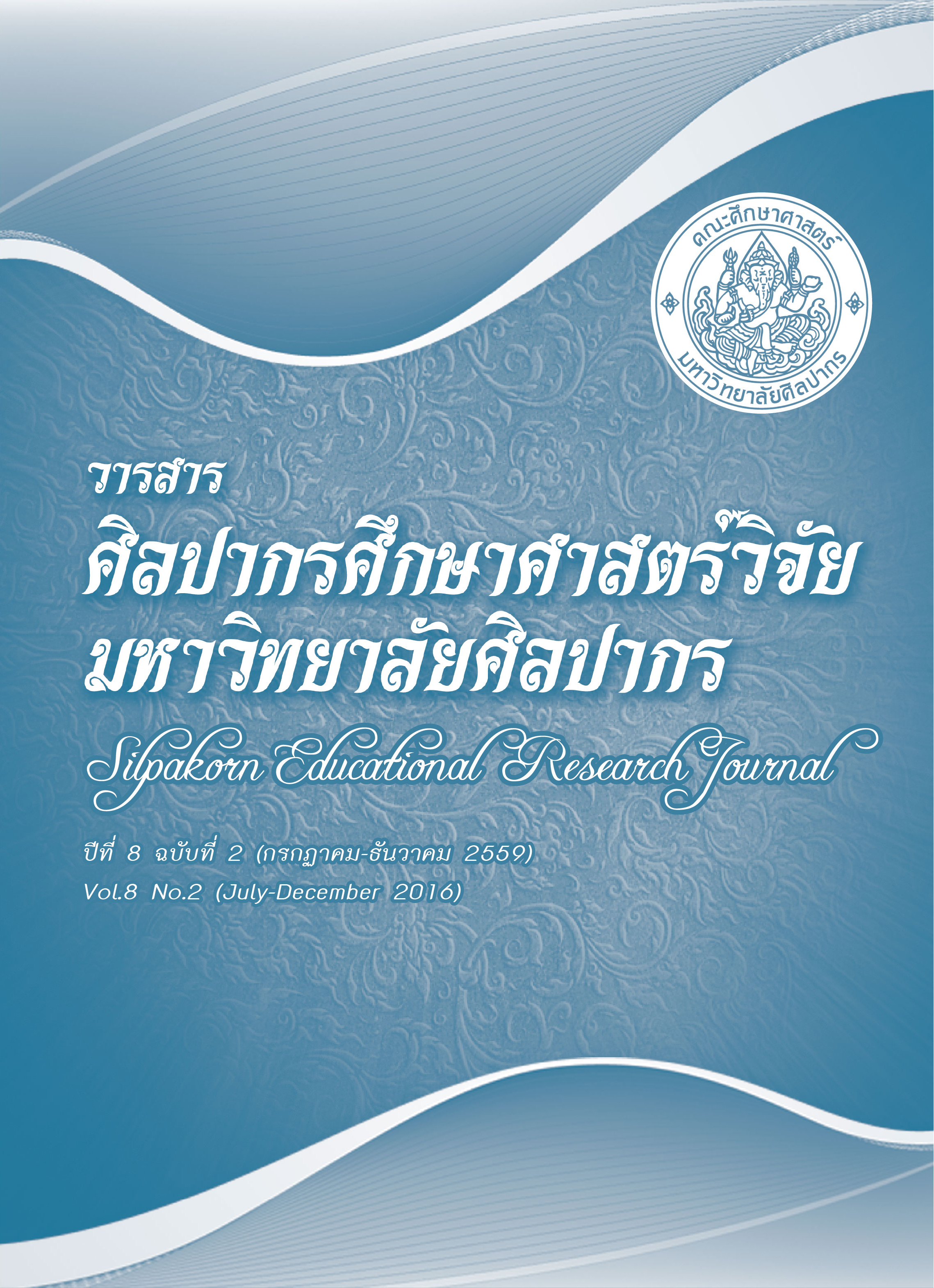การพัฒนารูปแบบการบริหารกิจกรรมพัฒนาผู้เรียนเพื่อส่งเสริมพหุปัญญา ของนักเรียนโรงเรียนเอกชน ในภาคตะวันออกเฉียงเหนือ (A Development of Administrative Model for Multiple Intelligence Promotion of Private School Students in Northeast Thailand)
คำสำคัญ:
รูปแบบ / การบริหาร / กิจกรรมพัฒนาผู้เรียน / พหุปัญญา / โรงเรียนเอกชน / Model/ Administration/ Student Development Activities/ Multiple Intelligences Theory/ Private Schoolบทคัดย่อ
การพัฒนารูปแบบการบริหารกิจกรรมพัฒนาผู้เรียนเพื่อส่งเสริมพหุปัญญาของนักเรียนโรงเรียนเอกชน ในภาคตะวันออกเฉียงเหนือ
A Development of Administrative Model for Multiple Intelligence Promotion of Private School Students in Northeast Thailand
บทคัดย่อ
การวิจัยครั้งนี้มีวัตถุประสงค์เพื่อ 1) ศึกษาองค์ประกอบของรูปแบบ 2) พัฒนารูปแบบ และ 3) ตรวจสอบความเหมาะสมของรูปแบบการบริหารกิจกรรมพัฒนาผู้เรียนเพื่อส่งเสริมพหุปัญญาของนักเรียนโรงเรียนเอกชนในภาคตะวันออกเฉียงเหนือ การดำเนินการแบ่งเป็น 3 ระยะคือ ระยะที่ 1 การสร้างกรอบแนวคิดการวิจัย ประกอบด้วย การวิเคราะห์เอกสาร งานวิจัย การศึกษาสถานศึกษาเอกชนดีเด่น จำนวน 4 แห่ง การประชุมกลุ่มผู้เชี่ยวชาญ จำนวน 10 คน ระยะที่ 2 การพัฒนารูปแบบ โดยสอบถามผู้เชี่ยวชาญ จำนวน 17 คน ใช้เทคนิคเดลฟายแบบปรับปรุง และระยะที่ 3 การตรวจสอบความเหมาะสมของรูปแบบ กลุ่มเป้าหมาย คือ ผู้อำนวยการและครูที่รับผิดชอบงานวิชาการโรงเรียนเอกชนระดับการศึกษาขั้นพื้นฐานที่มีผลการประเมินรอบสองจาก สำนักงานรับรองมาตรฐานและประเมินคุณภาพการศึกษา ในระดับดีและดีมาก จำนวน 340 คนเครื่องมือที่ใช้ในการรวบรวมข้อมูลเป็นแบบสอบถามประมาณค่า 5 ระดับ วิเคราะห์ข้อมูลโดยใช้ร้อยละ ค่าเฉลี่ย และส่วนเบี่ยงเบนมาตรฐาน
ผลการวิจัยพบว่า 1) รูปแบบการบริหารกิจกรรมพัฒนาผู้เรียนเพื่อส่งเสริมพหุปัญญาของนักเรียนโรงเรียนเอกชนในภาคตะวันออกเฉียงเหนือ ประกอบด้วย 3 องค์ประกอบ คือ ด้านปัจจัยเกื้อหนุน ด้านกระบวนการ และด้านผลผลิต 2) รูปแบบการบริหารกิจกรรมพัฒนาผู้เรียนเพื่อการส่งเสริมพหุปัญญาของนักเรียนโรงเรียนเอกชนในภาคตะวันออกเฉียงเหนือโดยรวมมีความเหมาะสมมากที่สุด ( = 4.53, = 0.48) เมื่อจัดลำดับความเหมาะสมองค์ประกอบทั้ง 3 เป็นดังนี้ ด้านกระบวนการ ด้านผลผลิตและด้านปัจจัยเกื้อหนุน ตามลำดับ
Abstract
The objectives of this study were to study the components of a model, develop and examine the suitability of the author's learner development activity administration model to promote multiple intelligences of private school students in the North-eastern region. The study was divided into 3 phases. The first phase was the research conceptual framework building, which consisted of document and research analysis, the study of 4 outstanding private schools and a group meeting of 10 experts. The second phase was the development of the model through the application of Modified Delphi Technique by consulting 17 experts. The third phase was the suitability examination of the author's developed model. The subjects were directors and academic teachers from private schools in 18 provinces in the North-eastern region that provided formal education from pre-school to primary level or from pre-school to secondary level and received an overall assessment in the “Good" and "Very Good" level in the second round of external quality assessment of schools from the Office for National Education Standards and Quality Assessment, totally 340. The tool used in data collection was a 5-level rating scale questionnaire. Percentage, mean and standard deviation were used in data analysis.
The study could be concluded as follows: 1) The author's learner development activity administration model to promote multiple intelligences of private school students in the North-eastern region comprised 3 components, which were 1.1 supporting factors; 1.2 process; and 1.3 outcome. 2) The overall suitability of the author's learner development activity administration model to promote multiple intelligences of private school students in the North-eastern region was at the highest level ( = 4.53, = 0.48). The suitability of the aforementioned 3 components could be prioritized as follows: process, outcome and supporting factors consecutively.





